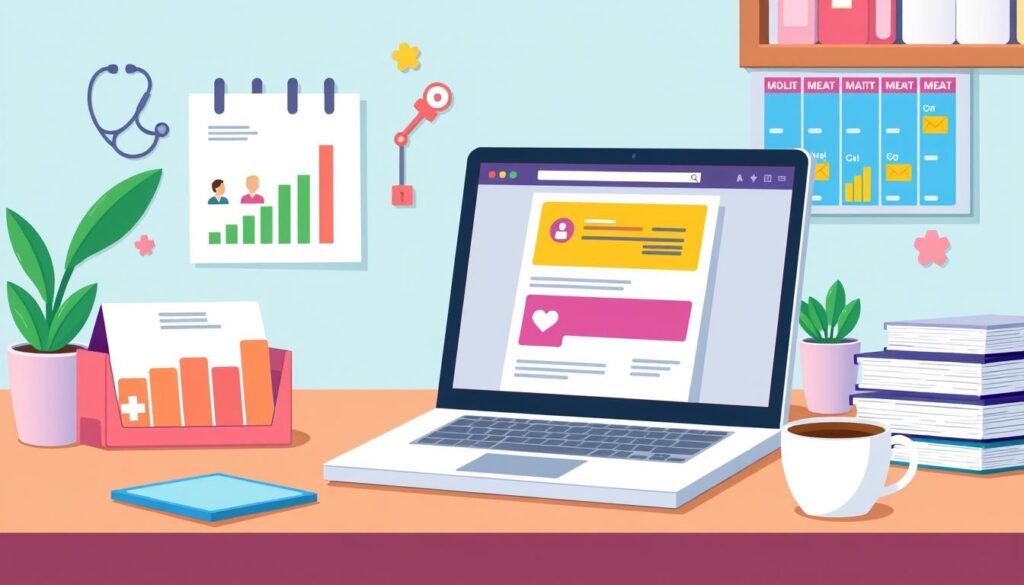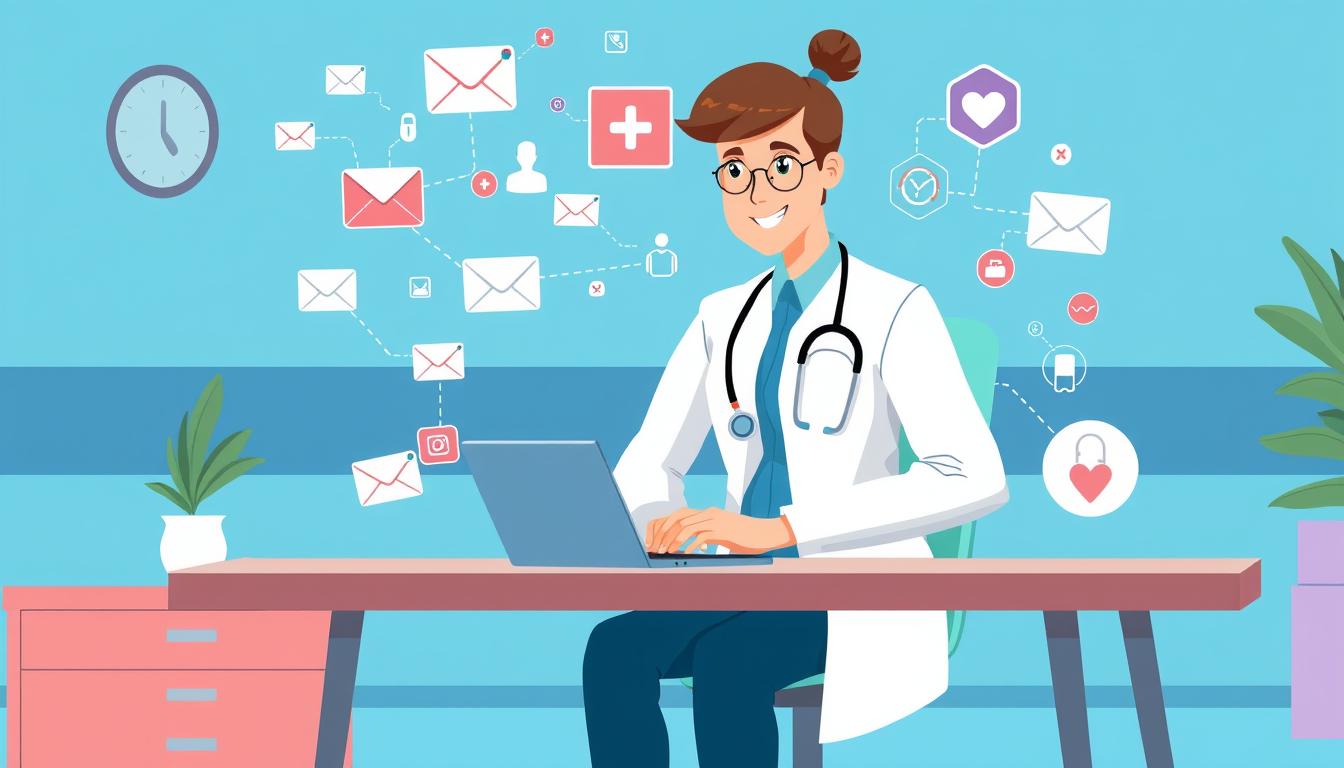Did you know that residents of the United States send about 10 billion emails daily? In the healthcare sector, this statistic underscores the vast potential of email marketing as a vital outreach tool. With healthcare spending in the United States exceeding $4.4 trillion annually, the efficiency of communication strategies plays a crucial role. Email marketing for healthcare allows you to engage patients effectively, providing essential messages like appointment confirmations, reminders, and promotional offers. When executed correctly, healthcare email campaigns can yield an impressive average return of more than $35 for every dollar spent.
However, navigating the complexities of HIPAA compliant email marketing is essential for ensuring patient privacy and trust. By focusing on the best practices for healthcare email marketing, you can enhance connections with your audience, ultimately improving patient engagement. As more than 70% of Americans search online for healthcare information before visiting a provider, a reliable digital outreach strategy is not just beneficial—it’s necessary. Let’s explore the remarkable advantages of optimizing your patient outreach through effective email marketing.
Key Takeaways
- Email marketing can significantly enhance patient engagement.
- Over 70% of Americans search for healthcare information online.
- Effective email campaigns yield high returns on investment.
- HIPAA compliance is crucial for protecting patient information.
- Personalization through segmentation improves open rates.
- Routine maintenance of email lists enhances deliverability.
- Automation streamlines patient communication effectively.
Understanding the Importance of Email Marketing for Healthcare
Email marketing has become an essential tool for healthcare organizations seeking to enhance patient communication. By utilizing healthcare email marketing strategies, you can directly share crucial information, such as appointment reminders, health updates, and educational content, right into your patients’ inboxes. This approach helps improve the overall patient experience and engagement.
The Role of Email in Patient Communication
Effective communication plays a vital role in healthcare. Timely email messages convey important health information and updates, as noted in studies that highlight the impact of consistent outreach on patient health outcomes. Utilizing personalized email marketing for healthcare allows providers to establish a more personal connection with patients, elevating their experience and encouraging proactive health management.
Building Trust Through Consistent Messaging
Patients are more likely to trust healthcare providers who maintain regular and relevant communication. Consistent messaging solidifies your position as a reliable resource, making explicit permission to access email addresses crucial. Following legal regulations and ensuring patient privacy fosters an atmosphere of trust, ultimately enhancing engagement and retention.
The Benefits of Targeted Campaigns
Targeted campaigns offer distinct advantages for healthcare email marketing services. Segmenting your audience based on demographics or health conditions allows for tailored messaging that resonates with individual patient needs. This personalized approach can boost engagement rates and improve health outcomes, ultimately promoting stronger patient-provider relationships.

| Indicator | Description | Importance |
|---|---|---|
| Click-Through Rate (CTR) | Measures audience engagement in campaigns. | Essential for assessing content effectiveness. |
| List Growth Rate | Indicates growth in the subscriber list. | Highlights reach and popularity of campaigns. |
| Spam Report Rate | Reflects effectiveness in inbox placement. | Key for improving campaign strategies. |
| On-demand Updates | Provide live metrics on email performance. | Facilitates real-time strategy adjustments. |
Crafting Effective Email Campaigns for Your Practice
Creating effective email campaigns is vital for connecting with your patients and enhancing engagement. Employing best practices for healthcare email marketing allows you to reach your audience in meaningful ways. By using strategies that cater specifically to healthcare needs, you can ensure your emails resonate with patients.
Segmenting Your Audience for Better Engagement
Effective segmentation of your audience leads to improved engagement. You can categorize patients based on demographics, health interests, and past interactions. This approach enables you to send targeted messages that reflect their specific needs, ultimately enhancing relationships. Utilizing email automation for healthcare can streamline this process, ensuring timely and relevant outreach.
Tips for Writing Compelling Subject Lines
Your subject line serves as the gateway to your content. An engaging subject line makes recipients want to open your email. Utilize action-oriented language, personalization, and urgency to spark interest in your messages. Remember, compelling subject lines contribute significantly to your open rates, which are crucial for overall campaign success in the healthcare sector.
Designing Visually Appealing Emails
Visually appealing emails can improve patient engagement significantly. An effective layout, balanced use of images, and clear fonts all enhance readability and accessibility. Ensure your email designs are optimized for both desktop and mobile devices, considering that 41% of email views occur on mobile. Invest in quality email marketing software for healthcare that offers pre-written templates, CTA buttons, and analytics to track engagement. A well-designed email draws potential patients to your content and services.

| Email Campaign Type | Purpose | Engagement Rate |
|---|---|---|
| Monthly Newsletter | Keep patients informed about practice news and health tips | 32.96% open rate |
| Promotional Emails | Encourage appointments or highlight services | High click-through potential |
| Social Media Updates | Integrate email with social campaigns | Varies |
| Informative Emails | Provide patients with valuable health information | Significant engagement |
| Educational Opportunities | Offer webinars or classes on health topics | High interest |
By implementing these strategies, you can craft targeted, engaging email campaigns that resonate with your audience and yield compelling results. Make sure to continually assess engagement metrics to refine your strategies over time.
Measuring Success and Improving Your Email Strategy
Understanding the performance of your email marketing efforts is essential for continuous improvement. By focusing on key metrics such as open rates, click-through rates, and conversion rates, you can gain valuable insights into how your communications resonate with patients. These metrics are vital for evaluating the effectiveness of your healthcare email marketing strategies and making informed adjustments. Additionally, personalizing content and segmenting your audience increases engagement, leading to higher conversion rates.
Key Metrics to Track Email Performance
In addition to standard metrics, consider tracking indicators that are specific to healthcare, such as new patient inquiries generated through email outreach. Monitoring these details allows you to assess the efficacy of your patient outreach efforts. Moreover, keeping an eye on email deliverability significantly reduces the risk of your messages landing in spam folders, thus improving your sender reputation.
A/B Testing: Finding What Works
A/B testing is a powerful tool for optimizing your email campaigns. By experimenting with different subject lines, content formats, and calls to action, you can identify what elements resonate best with your audience. Testing various schedules for send times can also enhance engagement, helping you find the perfect timing for your communications.
Adjusting Your Strategy Based on Patient Feedback
Patient feedback is invaluable in refining your email strategy. Utilizing surveys or direct requests for feedback can help you understand patient preferences and perceptions, ensuring that your email automation for healthcare aligns with their needs. Adjusting your approach based on these insights not only fosters better relationships with patients but also reinforces a patient-centered approach, ultimately enhancing the effectiveness of your HIPAA compliant email marketing efforts.









